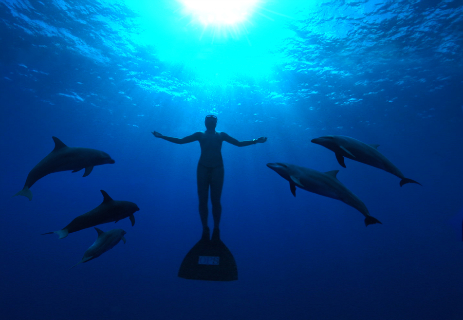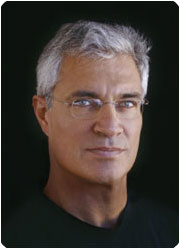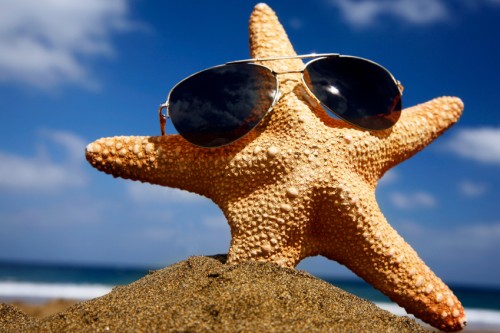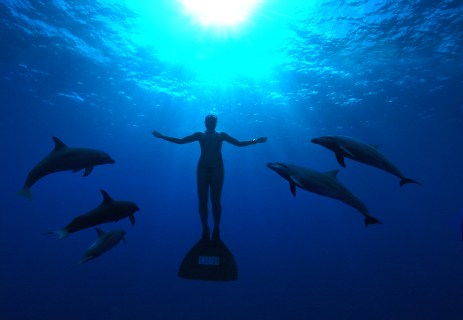 The Cove documents a the hunting of dolphins in one Japanese fishing village.Early on in The Cove, director Louie Psihoyos describes how he assembled an “Ocean’s Eleven”-like team of specialists to infiltrate and expose a secret, brutal, for-profit dolphin-killing operation in Japan.
The Cove documents a the hunting of dolphins in one Japanese fishing village.Early on in The Cove, director Louie Psihoyos describes how he assembled an “Ocean’s Eleven”-like team of specialists to infiltrate and expose a secret, brutal, for-profit dolphin-killing operation in Japan.
The description fits the film, which is structured more like an action thriller than a documentary. And the team, which includes a pair of world-class free divers, a “clandestine operations” specialist who’s discovered Caribbean shipwrecks, a rock concert organizer, and a spiritual surfer dude who co-founded Surfers for Cetaceans. (Cetacea, for marine-illiterate folk, is the order of marine mammals that includes dolphins, whales, and porpoises.)
The Cove documents the work of Ric O’Barry, who in a previous life spent 10 years as a dolphin trainer, most famously for the 1960s TV series Flipper, only to renounce that work and dedicate himself to fighting the dolphin captivity industry. O’Barry’s heartbreaking devotion to these highly intelligent mammals, and his deep guilt over Flipper‘s popularization of trained dolphin shows, form the emotional backbone of film.
O’Barry has been a fly in the ointment to the Japanese coastal town of Taiji for some time now, attracting hostility from the locals for his determination to stop its industry of dolphin capture and slaughter. A classic example of an inspiring breed of activist — i.e. someone who started on the other side before a crisis of conscience turned him — O’Barry is unafraid to cross the line in pursuit of his goals. When asked “How many times have you been arrested?” he responded, “This year?”
The movie’s unique storytelling style — a far cry from the academic talking heads and dire government statistics that suffocate most enviro docs — has earned The Cove much well-deserved critical acclaim already. Night-vision footage of Psihoyos’ badass team of eco-guerrillas sneaking into an isolated cove to plant high-def cameras, not to mention the literal bloodbath those cameras recorded, is compelling enough to keep mainstream audiences engaged. For that reason, The Cove serves as a model of how documentaries can stay relevant in today’s fast-paced media culture.
 Louie Psihoyos directed The Cove.Despite its nail-biting action, effortless pacing, and gruesomely engaging subject matter, The Cove ultimately commits one of the greatest enviro-activist sins: it is, in essence, just another save-the-cute-animals plea. Killing dolphins and then serving the mercury-tainted meat to Japanese schoolchildren is disgusting and immoral. Capturing dolphins and teaching them silly tricks does a great disservice to both them and the human race, which probably has a lot to learn from these skilled communicators. And Japan’s continued shirking of international whaling regulations should not be tolerated.
Louie Psihoyos directed The Cove.Despite its nail-biting action, effortless pacing, and gruesomely engaging subject matter, The Cove ultimately commits one of the greatest enviro-activist sins: it is, in essence, just another save-the-cute-animals plea. Killing dolphins and then serving the mercury-tainted meat to Japanese schoolchildren is disgusting and immoral. Capturing dolphins and teaching them silly tricks does a great disservice to both them and the human race, which probably has a lot to learn from these skilled communicators. And Japan’s continued shirking of international whaling regulations should not be tolerated.
But The Cove gets so caught up in the thrilling suspense of its own story that it neglects to hammer these points home hard enough, allowing O’Barry to toss most of them off without backup from other sources. And when the film ended, in my most cynical heart of hearts, I still had not been convinced of why this atrocity should matter to me personally. The Cove relies on its own shock value and misses an opportunity for a deeper exploration of why this baffling practice occurs, and of what other communities have to learn from it.
What I found more resonant than Taiji’s dolphin cruelties was the film’s footage from an International Whaling Commission meeting, which revealed the twisted political alliances and back-door dealings that often define international summits. Japan buys off tiny, impoverished nations like Dominica, St. Kitts, and the Marshall Islands, plying them with expensive building projects in exchange for backing for Japan’s continued violation of IWC regulations. The sense that this official bribery is a practice not unique to Japan calls into question whether international policymaking bodies can be forces for positive change in the world.
This depressing realization casts a cloud over the The Cove, and, for that matter, the upcoming climate talks in Copenhagen. After all, what does the work of people like O’Barry matter if, in the end, everyone’s fate is decided by cold-hearted, suit-wearing bureaucrats, who, behind the closed doors of conference rooms, trade our futures for a few bucks?
Go See It: Where you can see The Cove
Other Reviews: N.Y. Times | L.A. Times | The Washington Post




